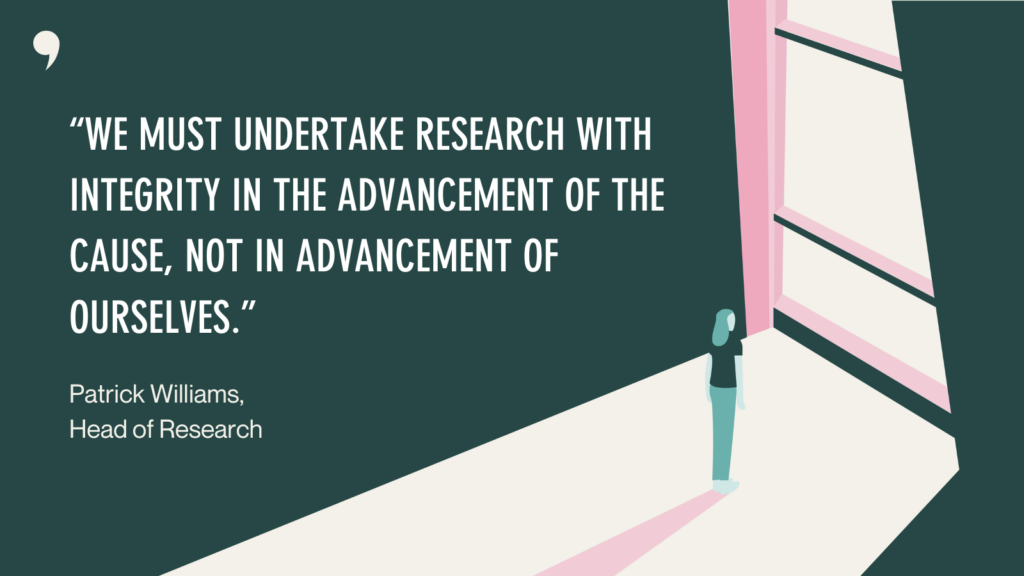At Systemic Justice, our research activities encompass community consultations, research conversations, data interrogation, analysis, and knowledge production – all carried out in service to racially, socially, and economically marginalised groups and communities. In alignment with our foundational values which we discussed in previous blog posts, we are committed to undertaking non-extractive research.

For us, extractive research is characterised by the funding, commissioning, conducting, production, and dissemination of research or knowledge that fails to uplift, represent, or reflect the experiences of racially, socially, and economically marginalised communities. Instead, it often serves the income generation interests of academics, higher education institutions, and a lucrative knowledge-exchange industry, which prioritises the perspectives of public and private corporations, politicians, inter-governmental departments and agencies, and a growing NGO sector.
Extractive research often parades in the form of a co-designed partnership between the researcher and communities, and yet as Mason and Williams recognise, there is often a disconnect “between the organisational values, structures and behaviours of higher education employers and the needs presented by communities, situated within the very same geographies, but defined away from the resources and opportunities to self-actualisation.
Extractive research approaches produce outputs that “attribute inferiority to difference” and dangerously serve to reproduce “the Other”. The excellent work of Krumer-Nevo and Sidi draws attention to the ways in which research and academic writing serve to Other.
First, such approaches decontextualise the everyday harms experienced by marginalised groups by abstracting their lived realities away from the structural drivers of inequality and injustice.
Second, such approaches serve in the objectification of communities and groups misrepresenting them as offensive categories such as the “gang member”, the “migrant”, the “welfare scrounger” – categories to be studied, (mis)understood and punitively controlled. These approaches neglect and increasingly, reject the historical contexts of colonialism and imperialism, which have created the contemporary social, economic, and political conditions under which those who are deliberately marginalised suffer. The resulting outputs overshadow and drown out the voices of those most impacted by systemic injustices.
From this position, rather than uplifting communities through building strategies of resistance and opportunities for change, extractive research outputs have increasingly been utilised to inform surveillance and regulatory apparatus for policing and law enforcement agencies. They have aided the design and construction of internal and external borders to exclude those who are most in need of social protection and support. And most concerningly, they are relied upon by those in positions of power to deny the structural drivers of systemic injustice.
Research for a cause, not just because.
Today we are forced to contend with a burgeoning research and knowledge exchange industry predominated by social scientists, psychologists, social researchers, evaluators, data scientists and economists – working in service to higher education institutions, government departments, and non-governmental and civil society organisations.
Research, knowledge, and understanding are advanced through argument and counterargument and the constant interrogation of our ideas and concepts, but our non-extractive principles demands being vigilant to the “evidenced” narratives that Other and harm racially, socially and economically marginalised communities. We must recognise how our own histories and life experiences inform our research questions and agenda. Being non-extractive requires us to be in permanent dialogue with and between ourselves and those whom we work in service to. We must be agile and inquisitive while remaining steadfast to our purpose, and undertake research with integrity in the advancement of the cause, not in advancement of ourselves.
Systemic Justice’s research is designed to surface and expose structural injustices as a resource to challenge the political, social, and economic drivers that cause harm. It foregrounds the silenced and excluded stories and narratives of those who are disproportionately affected by climate injustice, denied access to justice, are over-policed and under-protected, subjected to systemic and institutional racism and denied the freedom of movement. It is community-affirming, open to and accessible by all communities, and informs our strategies for resisting and ending systemic injustice.
